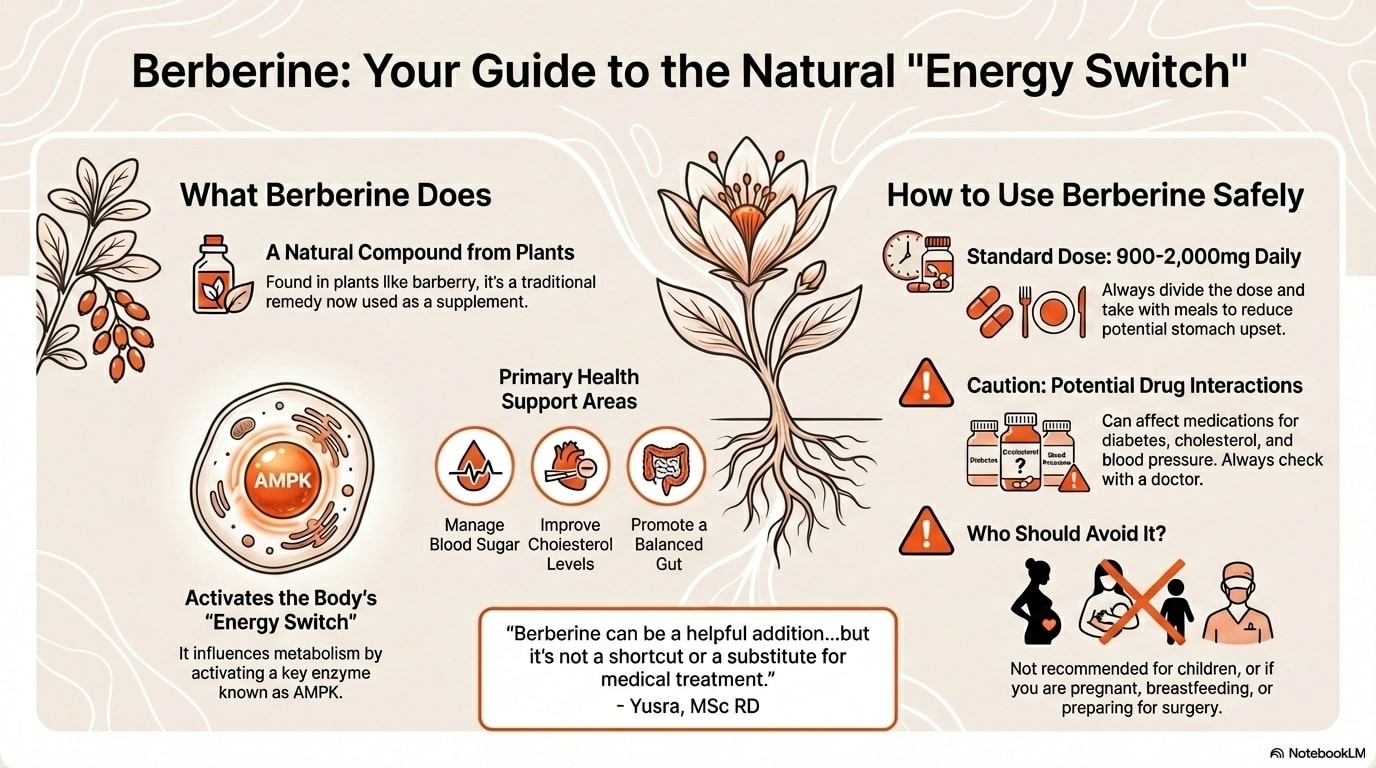Berberine
What is berberine?
Berberine is a natural compound found in plants like barberry, goldenseal, and Oregon grape. It has a bright yellow colour and has been used in traditional medicine for centuries. Today, it’s most commonly taken as a dietary supplement, usually in capsule form.

Learn more in our explainer video below:
What does berberine do?
Berberine influences how the body uses energy by activating an enzyme called AMPK [1][2], often referred to as the body’s “energy switch.” This helps regulate blood sugar levels, fat metabolism, and digestive health.
Why do people take it?
- Blood sugar support: May help reduce fasting blood sugar and HbA1c when used alongside a healthy diet and lifestyle.
- Cholesterol and triglycerides: Can modestly improve cholesterol and other blood lipid levels.
- Gut and metabolic health: Has natural antimicrobial properties that may promote a balanced gut microbiome.
- Weight management: Some people use it with a calorie-controlled diet as part of their nutrition plan and regular activity to support weight loss goals but it’s not a quick fix.
Remember that Berberine is classed as a food supplement in the UK, not a medicine. It should never replace treatment prescribed by a healthcare professional.
How is berberine taken?
Most berberine supplements come in capsule form. Research sugggests that the typical dose of berberine is between 900-2,000mg daily [3], divided into three or four doses alonside meals. Always read the product label and check with a pharmacist, dietitian, or doctor if you’re unsure about dosage or suitability.
Safety, side effects, and who should avoid it
- Common side effects: Mild stomach upset, cramping, constipation, or diarrhoea - often easing as your body adjusts.
- Low blood sugar risk: If you take medicines such as insulin, metformin, or GLP-1 treatments (like Wegovy and Mounjaro), berberine may enhance their effects. Speak to your prescriber before starting and monitor your levels as advised.
- Drug interactions: Berberine can alter how some medicines are broken down in the body, particularly those processed by CYP3A4 and P-glycoprotein. This may affect drugs like ciclosporin, statins, or blood pressure tablets. Always check for potential interactions.
- Pregnancy and breastfeeding: Avoid use - berberine can increase bilirubin levels in newborns, raising the risk of jaundice.
- Children: Not recommended.
- Surgery: Stop using at least two weeks before any planned operation unless your clinician advises otherwise.
How quickly does it work?
When berberine has an effect on blood sugar or cholesterol, it usually develops gradually over several weeks [4]. Long-term results depend on consistency and overall lifestyle including a balanced diet, good sleep, suitable fibre intake, regular exercise, and stress management.
Is berberine the same as prescription medicines for diabetes or weight loss?
No. Berberine is a supplement, not a licensed medicine. It should never replace prescribed treatments. If you have a diagnosed condition or take regular medication, always seek personalised medical advice before use.
Practical tips if supplementing
- Start with a lower dose and increase gradually to limit stomach upset.
- Take it with food, dividing your daily dose across meals as recommended by a healthcare professional.
- Track your progress and, if relevant, monitor blood sugar levels as advised by a healthcare professional.
- Focus on overall lifestyle - supplements can support, but not replace, a healthy routine.
When to seek professional advice
- If you have diabetes, heart, liver, or kidney conditions.
- If you’re taking prescription medicines or multiple supplements.
- If you’re pregnant, planning to conceive, or breastfeeding.
- If you experience side effects or symptoms of low blood sugar.
Nutritionist's Corner: Final Thoughts
“Berberine can be a helpful addition for some adults looking to support blood sugar, cholesterol, and gut health but it’s not a shortcut or a substitute for medical treatment. The foundations of good health remain the same; a fibre-rich diet, regular exercise, good sleep and stress management. If you take medication or have a health condition, check for interactions with your healthcare provider before starting and introduce it slowly.”
- Yusra Serdaroglu Aydin, MSc RD
Sources
Author

Yusra Serdaroglu Aydin, MSc RD
Head of Nutrition and Registered Dietitian
Yusra is a registered dietitian with a multidisciplinary background in nutrition, food engineering, and culinary arts. During her education, her curio...
